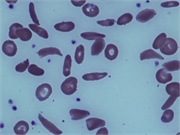- Could Your Grocery Store Meat Be Causing Recurring UTIs?
- Are You Making This Expensive Thermostat Error This Winter?
- Recognizing the Signs of Hypothyroidism
- 10 Strategies to Overcome Insomnia
- Could Artificial Sweeteners Be Aging the Brain Faster?
- Techniques for Soothing Your Nervous System
- Does the Water in Your House Smell Funny? Here’s Why
- Can a Daily Dose of Apple Cider Vinegar Actually Aid Weight Loss?
- 6 Health Beverages That Can Actually Spike Your Blood Sugar
- Treatment Options for Social Anxiety Disorder
What People With Sickle Cell Disease Need to Know About COVID-19

People with sickle cell disease are at increased risk for severe complications from COVID-19, an expert says.
“Many patients experience a pain crisis, also known as a vaso-occlusive crisis, early in COVID-19 infection before respiratory symptoms develop,” said Dr. Jennie Hart, clinical director of pediatric hematology/oncology at Herman and Walter Samuelson Children’s Hospital at Sinai in Baltimore.
COVID-19 can cause severe inflammation and lung injury. And that can have a greater impact on people with sickle cell disease, a group of inherited red blood cell disorders, Hart said.
People with the disease, which most commonly affects Black people, have misshapen red cells that can get stuck and clog blood flow, inhibiting oxygen delivery, damaging blood vessels and causing inflammation.
Some conditions — including respiratory infections such as COVID-19 — increase formation of sickle-shaped cells, because infections in the lungs lead to lower oxygen levels and worse inflammation.
“This increase in sickled red blood cells makes patients with sickle cell disease and COVID-19 infection particularly vulnerable to developing acute chest syndrome, a rapid and deadly lung injury,” Hart said in a news release.
People with sickle cell disease should stay home unless travel is essential, according to the Sickle Cell Disease Association of America.
“Patients who can work from home are strongly encouraged to do so. Your physician can provide a letter to your employer,” Hart said. Social distancing is a must, she added.
If you have sickle cell disease, call your doctor immediately if you develop a fever or chest pain, have difficulty breathing, or are experiencing a pain crisis, she advised.
Take all your medications as prescribed, especially if you’re taking hydroxyurea, which reduces certain complications from sickle cell disease, she added.
Stay well hydrated, wash your hands often and avoid close contact with people who have symptoms of a respiratory infection, Hart said.
More information
The American Academy of Family Physicians has more on sickle cell disease.
Source: HealthDay
Copyright © 2026 HealthDay. All rights reserved.










